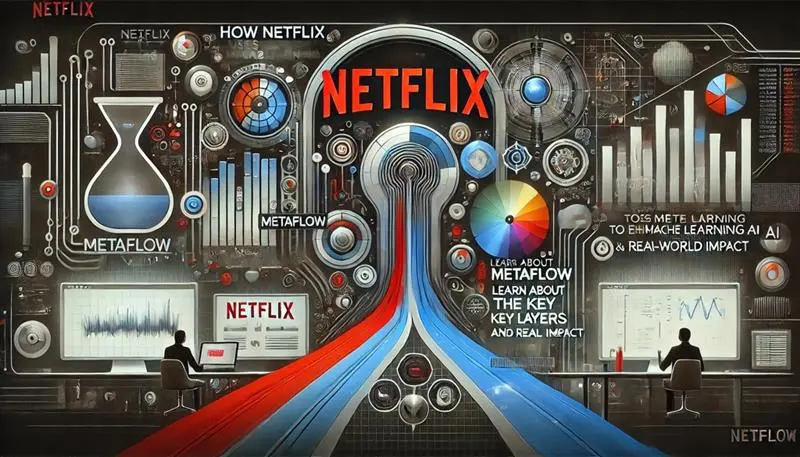Netflix has redefined the entertainment landscape, and a significant part of its success stems from its ability to utilize cutting-edge machine learning (ML) and artificial intelligence (AI) technologies. The company’s ML systems power everything from personalized recommendations to efficient content creation workflows. At the core of these systems lies Metaflow, Netflix’s open-source machine learning platform. This blog delves into how Netflix utilizes Metaflow to support a wide range of ML and AI use cases, making complex processes seamless and scalable.
What is Metaflow?
Metaflow is a Python-based machine learning framework designed to simplify the journey from prototype to production. Developed by Netflix, Metaflow provides tools for data scientists and ML practitioners to build, manage, and deploy ML projects at scale. Its user-friendly API, integrated production systems, and robust extensibility make it ideal for handling Netflix’s diverse ML workloads.
Since its inception, Metaflow has focused on making ML workflows human-centric by abstracting the complexity of backend integrations. However, its true strength lies in how well it integrates with Netflix’s existing infrastructure, ensuring that models move seamlessly from development to production.
Key Layers of Metaflow
Metaflow is built on a stack of carefully designed integrations that enable efficient data handling, computation, orchestration, and deployment. Let’s explore how each layer contributes to Netflix’s ML ecosystem:
1. Data: Fast Data Processing
Netflix stores massive amounts of data in its data lake, hosted on Amazon S3 and organized as Apache Iceberg tables. Metaflow’s Fast Data library ensures that data scientists can interact with these datasets efficiently.
- Table Interface: Handles metadata parsing and resolves partitions for Apache Iceberg or Hive tables.
- Metaflow Data Frame: Downloads data using a high-throughput S3 client and uses Apache Arrow for in-memory data representation.
The Fast Data library supports last-mile data processing tasks such as feature transformation and batch inference, even for terabyte-scale datasets. By leveraging tools like Pandas or Polars for data manipulation, Netflix ensures high performance without being locked into rigid dependencies.
Example Use Case:
Netflix’s Content Knowledge Graph encodes relationships between titles, actors, and attributes. Using Metaflow, billions of entity pairs are matched efficiently, supporting complex workflows like title matching and resolving conflicting information at scale.
2. Compute: Titus Integration
For compute-heavy tasks, Metaflow integrates with Titus, Netflix’s custom compute platform built on Kubernetes. This integration provides scalable, secure, and cost-efficient compute environments.
- Dependency Management: Metaflow’s support for @conda and @pypi ensures portable execution environments that simplify dependency resolution across various ML workflows.
- Reproducible Environments: Developers can rehydrate execution environments in remote pods without manually managing Docker images.
Example Use Case:
In model explainability workflows, Netflix trains “explainer models” alongside predictive models. These workflows require access to both the original model’s environment and additional dependencies for the explainer model. Metaflow’s portable environments enable dynamic dependency resolution, ensuring flexibility and reproducibility.
3. Orchestration: Maestro
Managing dependencies between ML workflows requires robust orchestration. Netflix uses Maestro, its in-house workflow orchestrator, to automate event-triggered processes and ensure high availability.
- Event-Driven Flows: Metaflow workflows can be triggered by upstream or downstream dependencies, enabling seamless integration across teams and systems.
- Development Flexibility: Features like namespaces and branch isolation allow developers to test workflows without interfering with production systems.
Example Use Case:
In Content Decision Making, Metaflow supports Netflix’s strategy for selecting content that appeals to its global audience. Sophisticated data pipelines and models operate daily, with Maestro orchestrating dependencies between hundreds of components to manage this large-scale decision-making system.
More From Author: SportsTech
4. Deployment: Precomputed Caching and Real-Time Hosting
Metaflow simplifies deployment by offering tools for both precomputed results and real-time API hosting.
- Precomputed Caching: For applications where predictions can be precomputed, Metaflow’s caching infrastructure ensures low-latency data access.
- Metaflow Hosting: This integrated model hosting service provides RESTful APIs for real-time evaluations, auto-scaling, and cost-efficient operations.
Example Use Cases:
- Content Performance Visualization: Aggregate metrics for Netflix titles are computed daily and stored in a cache. Decision-makers access these metrics via a Streamlit app, enabling interactive analysis.
- Media Processing: Features for media assets are computed on demand using Metaflow Hosting, reducing computational overhead while maintaining flexibility.
Real-World Impact
By leveraging Metaflow’s integrated stack, Netflix has achieved:
- Scalability: Handling billions of data points and terabyte-scale workflows with ease.
- Efficiency: Reducing operational overhead by automating dependency management and workflow orchestration.
- Flexibility: Supporting diverse use cases ranging from media processing to content recommendations.
- Rapid Development: Allowing small teams to manage complex ML systems autonomously.
Future of Metaflow at Netflix
Netflix plans to further enhance Metaflow with improvements in artifact versioning, better model logging, and integrations with non-Python environments. These updates aim to bridge the gap between quick Python-based experimentation and robust production systems.
Additionally, Netflix is exploring ways to make Metaflow artifacts more compatible with JVM-based engineering systems, expanding the platform’s usability across its diverse tech stack.
The Metaflow Effect: Driving Netflix’s ML-Powered Innovation
Metaflow has become an indispensable part of Netflix’s machine learning ecosystem, empowering data scientists and ML engineers to build scalable, production-grade systems. By abstracting complexity and integrating deeply with Netflix’s infrastructure, Metaflow ensures that ML workflows are not just powerful but also accessible and user-friendly.
As Netflix continues to innovate in the entertainment industry, Metaflow’s adaptability and robustness will play a critical role in enabling the next generation of ML-powered experiences.






